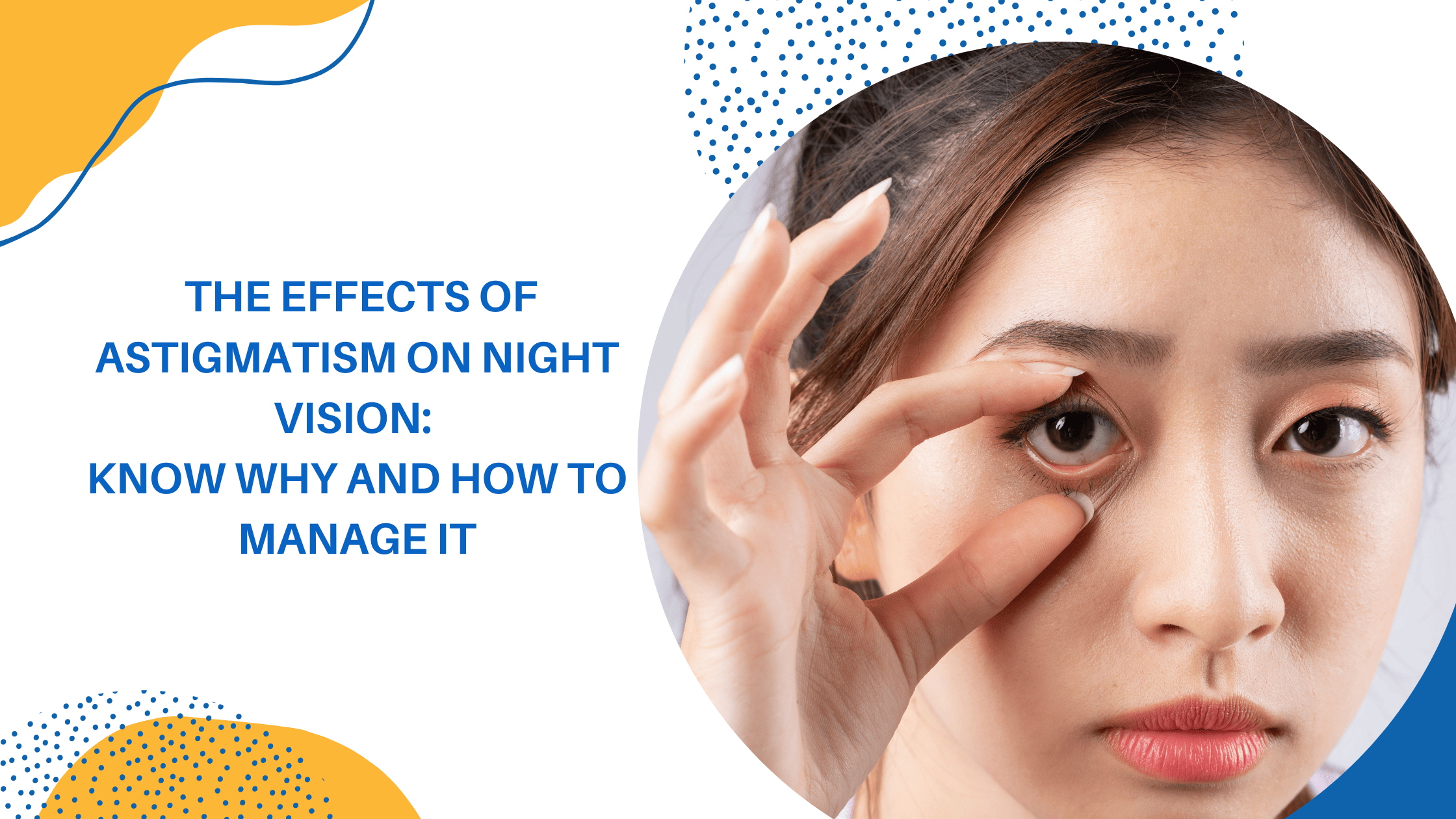The Effects of Astigmatism on Night Vision: Know Why And How To Manage It
If you’ve ever struggled with blurry or distorted vision at night, you might be experiencing the impact of astigmatism.
Astigmatism is a common eye condition causing blurred or distorted vision at all distances. While astigmatism can be bothersome, the good news is that it can often be corrected with the right treatment.
In this blog, we’ll explore why astigmatism affects night vision and offer practical tips and solutions to help you easily navigate low-light environments.
What is Astigmatism?
Astigmatism is a common eye condition affecting how light rays enter the eye, resulting in blurred or distorted vision.
It occurs when the eye’s front surface (cornea) or the lens inside it has mismatched curves. Instead of having one curve like a round ball, the surface is egg-shaped. As a result, light rays are not focused on a single point on the retina, leading to a blurred image.
It is common to have astigmatism in combination with nearsightedness or farsightedness and can be treated through corrective lenses or surgery.
It is important to rule out keratoconus in patients with astigmatism. Treatment protocol and the prognosis varies in eyes that have astigmatism with keratoconus.
What are the Symptoms of Astigmatism?

The symptoms of astigmatism can vary in severity and may include:
- Blurred or distorted vision
- Eye strain and discomfort
- Headaches
- Eye irritation
- Reduced night vision
- Squinting to see clearly
It’s important to note that these symptoms can also be present in other eye conditions.
Therefore, it’s crucial to undergo a comprehensive eye examination by an eye specialist to diagnose astigmatism, especially if you experience any changes in your vision or eye discomfort.
What is the Effect of Astigmatism on Night Vision?
The effect of astigmatism on an individual’s vision varies on the type and severity of astigmatism they have.
Generally, astigmatism can lead to the following effects:
- Fuzzy light beam or glares.
- Feel of need to squint to focus.
- Streaks of light beams or glares from the headlights of the vehicles.
- Increase of vision-related problems during rain.
- Lights or other things may look blurry.
- There may be halos present around the light source.

If you are facing problems in seeing at night, for example, if you have noticed issues like halos around street lights or glare from the headlight of the upcoming vehicles, then that does not mean that you have astigmatism.
At night or in other low light conditions, our pupil dilates and allows more light to enter the eyes for seeing better. This increases the symptoms of astigmatism and may increase the blurring and night glares. Other medical conditions like myopia, cataracts, and glaucoma can also lead to these symptoms.
The effect of astigmatism on an individual’s vision varies on the type and severity of astigmatism they have.
Generally, astigmatism can lead to the following effects:
- Fuzzy light beam or glares.
- Feel of need to squint to focus.
- Streaks of light beams or glares from the headlights of the vehicles.
- Increase of vision-related problems during rain.
- Lights or other things may look blurry.
- There may be halos present around the light source.
If you are facing problems in seeing at night, for example, if you have noticed issues like halos around street lights or glare from the headlight of the upcoming vehicles, then that does not mean that you have astigmatism.
At night or in other low light conditions, our pupil dilates and allows more light to enter the eyes for seeing better. This increases the symptoms of astigmatism and may increase the blurring and night glares. Other medical conditions like myopia, cataracts, and glaucoma can also lead to these symptoms.
What are the Treatment Options for Astigmatism?
The goal of correcting astigmatism is to improve vision clarity and eye comfort. The most common and effective treatment options for astigmatism include:
Corrective Lenses
Wearing corrective lenses treats astigmatism by counteracting uneven curvatures of your cornea or lens.
Types of corrective lenses include:
- Eyeglasses- Glasses are an effective way to correct astigmatism. This will help you to look in a better way. Eyeglasses can also correct for other refractive errors, such as nearsightedness or farsightedness. Eye Glasses will need to have cylindrical powers and correct astigmatism.
- Contact Lenses- Like eyeglasses, contact lenses can correct most astigmatism. They are available in a variety of types and styles. You can choose from soft disposable lenses, hard gas-permeable lenses, and extended-wear lenses. For correction of astigmatism and cylindrical powers that are caused by the presence of astigmatism. Toric Contact lenses may be suggested by your eye doctor.
Refractive Surgery
Refractive surgery is an effective and permanent option for correcting astigmatism. An eye specialist uses a laser beam to reshape the cornea, thus improving your vision.
Types of refractive surgery for astigmatism include:
- Photorefractive keratectomy (PRK)
- Laser-assisted in-situ keratomileusis (LASIK)
- Small-incision lenticule extraction (SMILE)
Orthokeratology
Orthokeratology, or Ortho-K, involves using specially designed gas-permeable contact lenses that reshape the cornea temporarily. They can be worn before you go to bed to have clear vision during the day without the need for glasses or contacts.
Implantable lenses
Another surgical option for moderate to severe astigmatism is the implantation of phakic intraocular lenses. These lenses are implanted either between the cornea and the iris or behind the iris.
A comprehensive eye examination with an eye specialist is crucial to determine the appropriate treatment of astigmatism for you. The most appropriate treatment choice will depend on the severity of astigmatism, personal preferences, and overall eye health.

Consult Krishna Eye Centre for Expert Eye Care
Krishna Eye Centre is a leading eye clinic in Mumbai. Here, we offer outstanding advanced eye care and are deemed the best eye hospital in Mumbai.
Our eye specialist in Mumbai can help with eye care advice, treatment, and thorough checkups.
Book your appointment with a click!
